Unit 2 I'll help to clean up the city parks Section A 1a-2d课件
文档属性
| 名称 | Unit 2 I'll help to clean up the city parks Section A 1a-2d课件 |
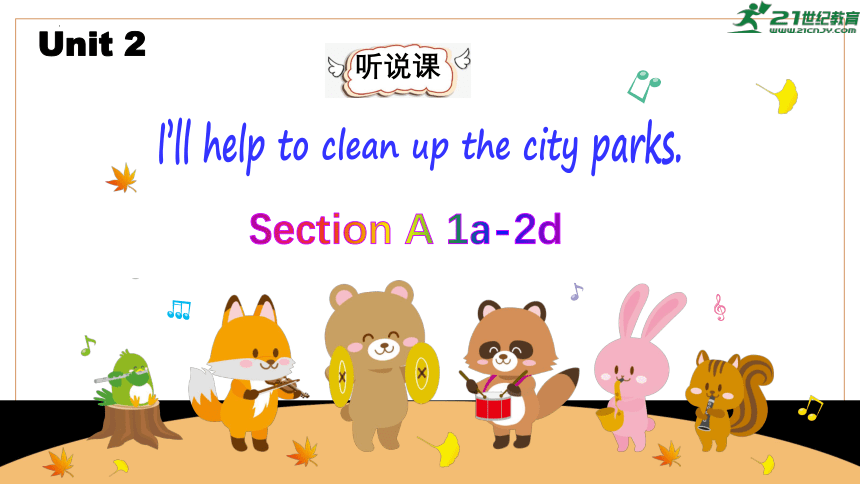
|
|
| 格式 | pptx | ||
| 文件大小 | 34.0MB | ||
| 资源类型 | 试卷 | ||
| 版本资源 | 人教新目标(Go for it)版 | ||
| 科目 | 英语 | ||
| 更新时间 | 2023-02-23 00:00:00 | ||
图片预览

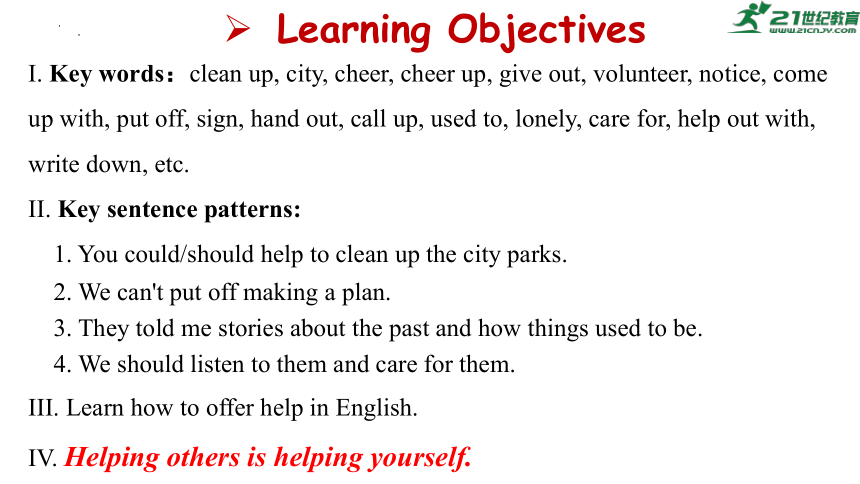
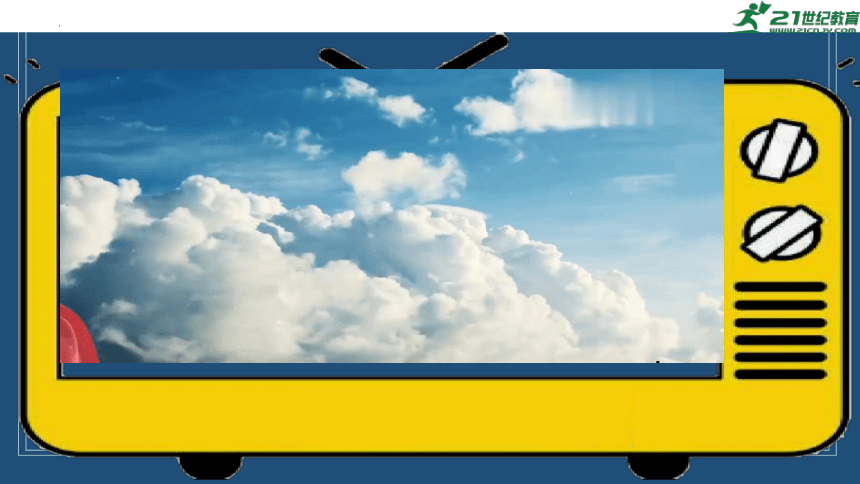

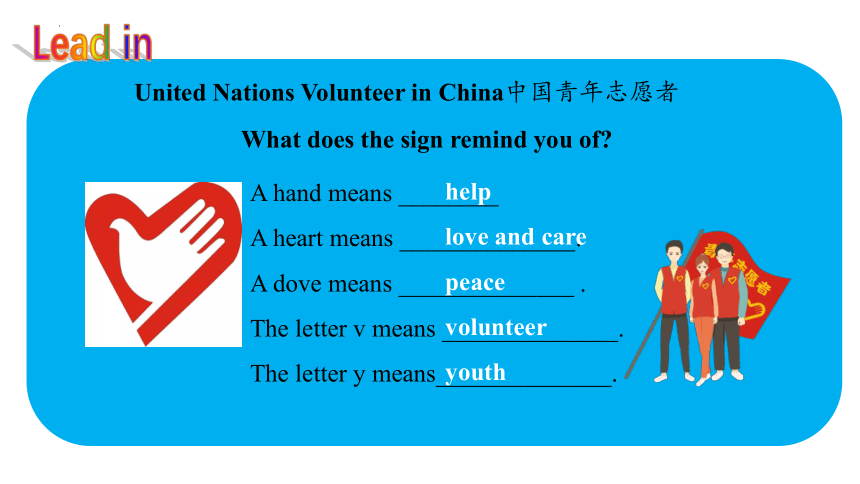
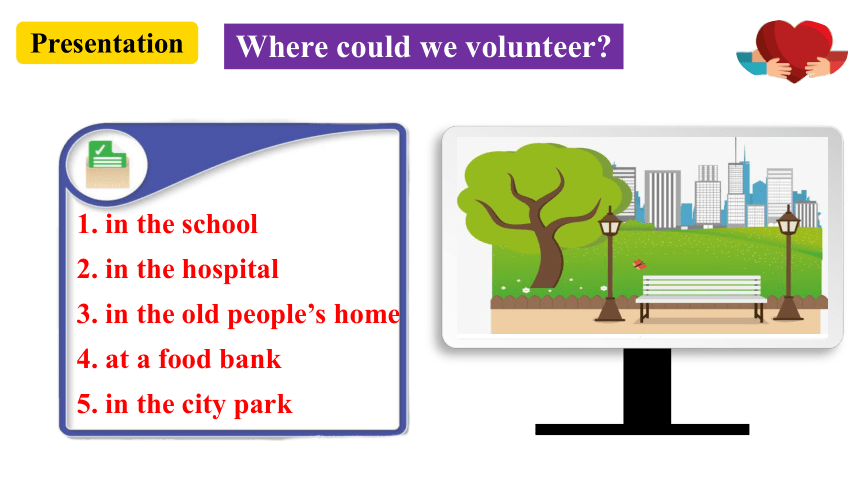
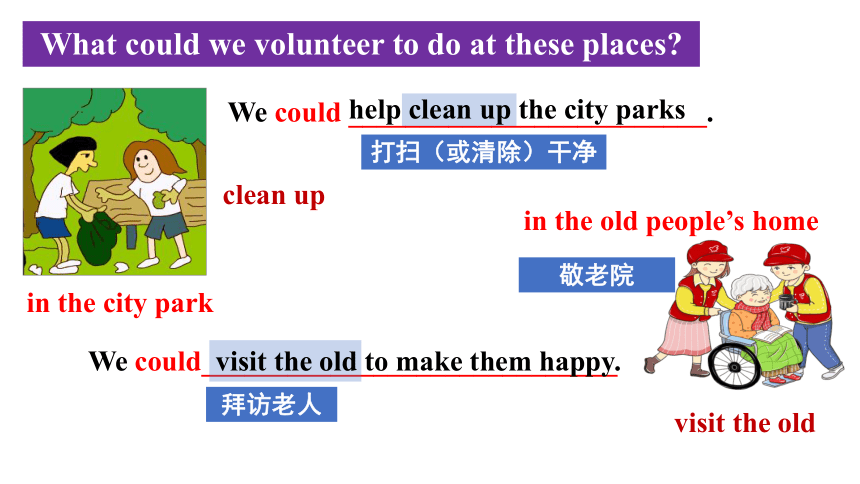
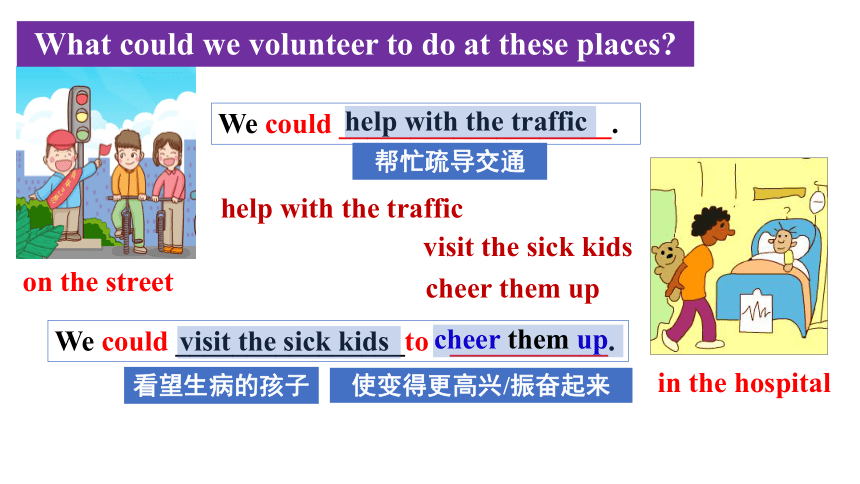
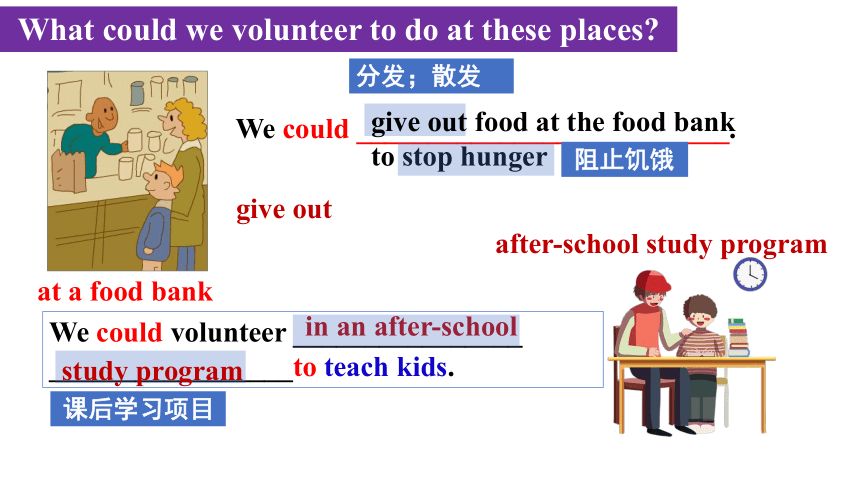
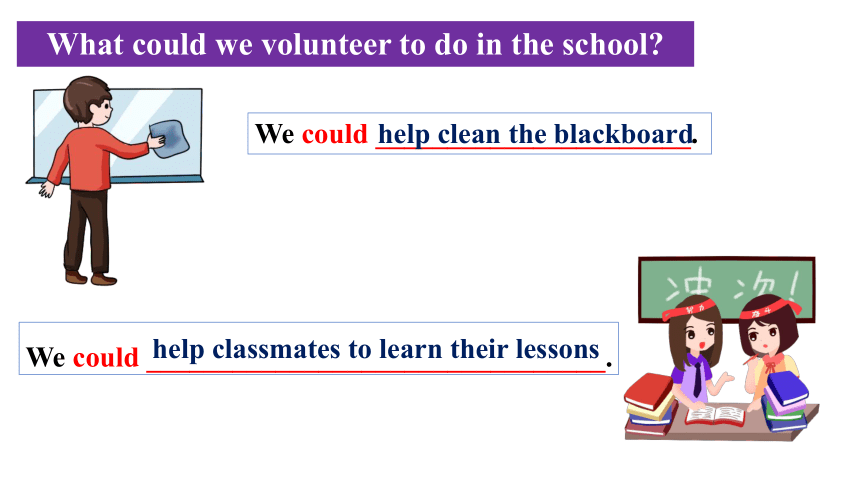
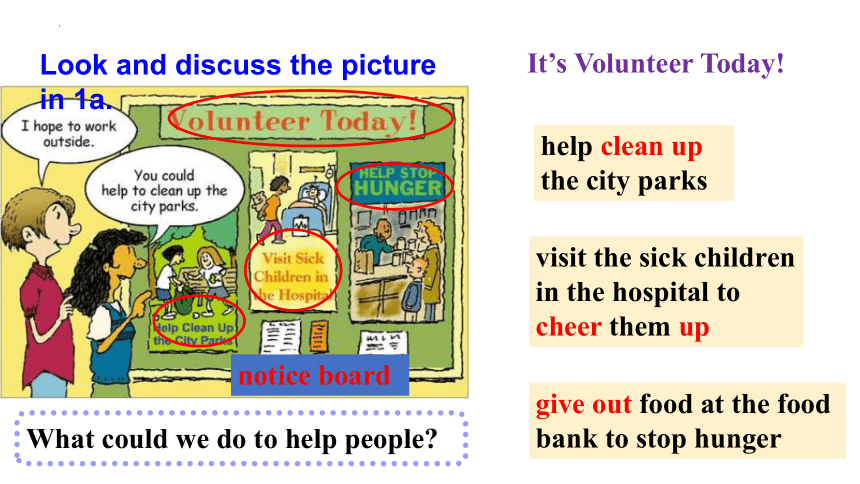
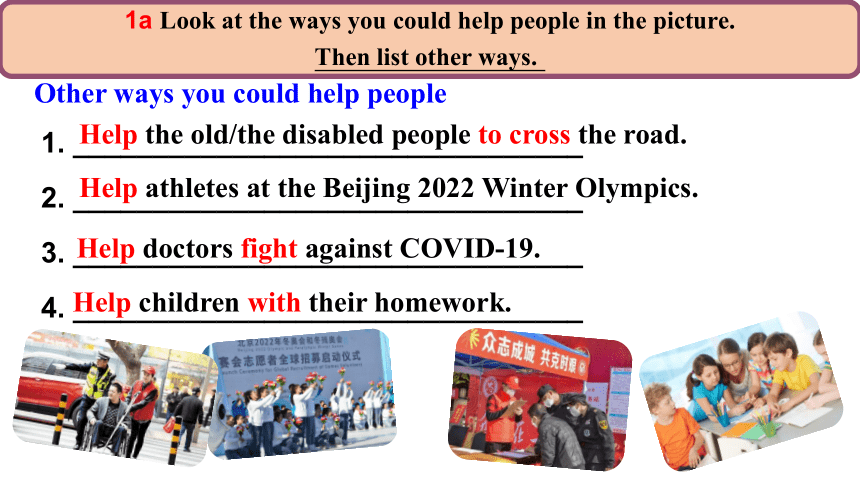
文档简介
(共34张PPT)
Section A 1a-2d
Unit 2
听说课
I’ll help to clean up the city parks.
I. Key words:clean up, city, cheer, cheer up, give out, volunteer, notice, come up with, put off, sign, hand out, call up, used to, lonely, care for, help out with, write down, etc.
II. Key sentence patterns:
1. You could/should help to clean up the city parks.
2. We can't put off making a plan.
3. They told me stories about the past and how things used to be.
4. We should listen to them and care for them.
III. Learn how to offer help in English.
IV. Helping others is helping yourself.
Learning Objectives
Who are they
They’re volunteers.
志愿者(n);自愿做(v);
They usually volunteer to help others.
Lead in
A hand means ________
A heart means ______________.
A dove means ______________ .
The letter v means ______________.
The letter y means______________.
help
love and care
peace
volunteer
youth
What does the sign remind you of
United Nations Volunteer in China中国青年志愿者
Where could we volunteer
1. in the school
2. in the hospital
3. in the old people’s home
4. at a food bank
5. in the city park
Presentation
We could _________________________.
打扫(或清除)干净
We could_____________________________
敬老院
What could we volunteer to do at these places
in the city park
help clean up the city parks
clean up
in the old people’s home
拜访老人
visit the old
visit the old to make them happy.
We could ___________________.
We could ________________to ___________.
What could we volunteer to do at these places
in the hospital
help with the traffic
on the street
visit the sick kids
visit the sick kids
help with the traffic
使变得更高兴/振奋起来
cheer them up
帮忙疏导交通
cheer them up
看望生病的孩子
We could __________________________.
We could volunteer ________________ _________________to teach kids.
分发;散发
课后学习项目
at a food bank
give out food at the food bank
to stop hunger
give out
after-school study program
in an after-school
study program
阻止饥饿
What could we volunteer to do at these places
We could ______________________.
We could ________________________________.
What could we volunteer to do in the school
help clean the blackboard
help classmates to learn their lessons
Look and discuss the picture in 1a.
What could we do to help people
help clean up the city parks
visit the sick children in the hospital to cheer them up
give out food at the food bank to stop hunger
It’s Volunteer Today!
notice board
1a Look at the ways you could help people in the picture.
Then list other ways.
Other ways you could help people
1. ________________________________
2. ________________________________
3. ________________________________
4. ________________________________
Help the old/the disabled people to cross the road.
Help athletes at the Beijing 2022 Winter Olympics.
Help doctors fight against COVID-19.
Help children with their homework.
While-listening
_____ The girl could visit the sick kids in the hospital to cheer them up.
_____ The boy could give out food at the food bank.
_____ The girl could volunteer in an after-school study program to teach kids.
_____ The boy could help to clean up the city parks.
3
2
4
1
打扫(或清除)干净
v. 义务做;自愿做 n. 志愿者。volunteer to do sth.自愿做某事
在课外学习项目中
=hand out分发;散发
(使)变得更高兴;振奋起来。代词放中间。
在食品救济站
1b
Listen and number the ways the boy and girl could help others.
listening skills :
Before listening: underline(下划线)the key phrases (关键词组)then number the ways .(排序)
While-listening
1. A: I’d like to ______ outside.
B: You could help _____ _____ the city parks.
2. A: I’d like to ______ homeless people.
B: You could give _____ food at the food bank.
3. A: I’d like to cheer _____ sick kids.
B: You could ______ them in the hospital.
4. A: I’d like to help kids _____ their schoolwork.
B: You could __________ in an after-school study program.
work
up
help
out
up
visit
with
volunteer
Listen again and fill in the blanks.
clean
用来表达意愿:
I hope to…
I’d like to…
=I would like to…
I want to…
情态动词could用来表达如何为他人提供帮助,含有建议的语气。
I’d like/ hope/ want to…
1. work outside
2. help homeless people(无家可归的人)
3. cheer up sick kids
4. help kids with their schoolwork
You could…
clean up the city parks
give out food at the food bank
ask hospitals to let you visit the kids
volunteer to teach kids
Make conversations using the information in activity 1b.
1c
Our City Clean-Up Day is coming.
Few people know about the day.
Can you come up with ideas to let people know it
a City Park Clean-Up Day
一个城市公园清洁日
clean--up名词, “(大)扫除”
come up with 想出;提出(主意、计划、回答等)“动词+副词+介词”短语
We can’t put off making the plan.
put off 推迟;拖延
put off doing sth推迟做某事
New drills
We could put an ad on TV.
We could put up signs.
We could call up some friends.
How to let others know your plan
ad. 广告缩写
=advertisement
put up 张贴,搭建
call up sb. “给……打电话”
【注意】动词+代词+副词(call him up)
How to let others know your plan
Let’s put an ad in the newspaper.
Let’s make some notices. And hand them out.
Write down your ideas.
hand out“分发”
notice 通知
Do you know their meanings
come up with
put off
put up
hand out
call up
to give many people something, usually on the street
to think of some ideas
to ask many people to do something
to make something done later
to raise something
put an ad on TV
call up friends
put up some signs
put an ad in the newspaper
hand out notices
Read the phrases below. And then match them with the pictures.
Pre-listening
a
b
c
d
e
√
√
√
2a
A group of students are planning a City Park Clean-Up Day. Listen and check(√) the things they are going to do to tell people about it.
1. We need to _____ ____ _____ a plan to tell people
about the city park clean-up.
2. Clean-Up Day is only two weeks from now. We
can’t ____ ____ making a plan.
3. We could ____ ____ signs.
4. Let’s make some notices, too. Then I’ll ____ them ____ after school.
5. We could each ____ ___ 10 students and ask them to come.
come up with
put off
put up
hand
call up
out
提出;想出
推迟
张贴
分发
打电话给某人
2b
Listen again. Fill in the blanks.
While-listening
According to what you heard in 2b, use right phrasal verbs to fill in the blanks.
We’d like to help ______ ______ the city parks. First, we need to ______ ______ ______a plan. Clean-up Day is only two weeks from now, so we can’t_______ _______making a plan any more. There are some ways we could tell others. We could_______ ______signs and we also could each_______ _______ ten people and ask them to come. Besides, we’ll ______ _______ advertisements after school. That’s great. We are thinking up a lot of ideas. We should ______ _____ all our ideas.
come up with
put
off
clean up
put
up
call
hand out
write down
up
1.Where's Helen going to work this summer
She's going to work in an old people's home.
2.What did Tom do to help the old people
Reading the newspaper or just talking to the old people.
Helen: Hi, Tom. I’m making some plans to work in an old people’s home
this summer.
Tom: Really I did that last summer!
Helen: Oh, what did they ask you to help out with
Tom: Mmm… things like reading the newspaper to the old people, or just talking to them. They told me stories about the past and how things used to be.
Helen: That sounds interesting.
Tom: Yeah, a lot of old people are lonely. We should listen to them and
care for them.
Helen: You’re right. I mean, we’re all going to be old one day, too.
Role-play the conversation and answer the questions in 2d.
make plans to do sth 制定做某事的计划
help out with sth 帮助分担某事
used to do sth 过去曾经做某事
be used to doing 习惯做某事
care for sb 关心、在意某人
mean to do计划做某事; mean doing sth意味着
Fill in the blanks according to the conversation.
Helen is making plans to work in an old people’s home this summer. Tom volunteered there last summer. He ______ the newspaper to the old people or just ________ them. The old people _______________ about the past and how things _______ be. They are lonely. We should ________ them and _______ them, as we are all going to be old _______, too.
read
talked to
told Tom stories
listen to
care for
one day
used to
Read the newspaper to the old people and talk to / with them.
Let them tell their stories in the past.
Talk with them.
Care for them.
Help them clean their rooms.
Write to their friends or families for them.
What are old people’s home look like in China What can we do in old people’s home
Summary
1. clean up/cheer up/call up/give up/put up
2. give out hand out 分发
I hope to ... You could… I ’d like to... I want to ...
3. come up with
4. put off 推迟 put it / them off put off doing
5. volunteer (n.) work as a volunteer
volunteer to do sth.
Language points
call up:“打电话给……”
My dad called me up to tell me the good news.
我爸爸打电话告诉了我这个好消息。
Call me up any time.
随时打电话给我。
1. And we could each call up 10 students and ask them to come.
1. give … a call
I’ll give you a call at the weekend.
2. ring up
Did you ring up your father last week
3. give …a ring
Do you know who gave Zhang Hua a ring an hour ago
4. telephone /phone (to)…
Will you please telephone to the policeman
“给……打电话”的常见说法
Language points
The man needs an English dictionary when he works.
这个人在工作时需要一本英语词典。
Do you need to see him yourself
你必需亲自见他吗?
2. Now we need to come up with a plan to tell people about the city park clean-up.
need : 是一个常见的动词,表示“需要”之意。它既可以作实义动词,也可以作情态动词。
1) need 用作实义动词,有“必要”、“必需”之意,有人称、数和时态的变化,可以接名词、代词、动名词或带to 的动词不定式作宾语,构成疑问句和否定句时要借助于助动词。
Language points
Need you go to the park with your classmate
你必须和你的同学去公园吗?
He needn’t spend much money for this new watch.
他不必花掉这么多钱买这块新手表。
6. Now we need to come up with a plan to tell people about the city park clean-up.
2) need,用作情态动词, “必须”、“必要”,没有人称、数等变化,后接不带to 的动词不定式。 通常用于疑问句和否定句中,构成疑问句和否定句时,不需要使用助动词。
【注意】 由need引出的疑问句,答语表肯定时用must或have to;表示否定时用needn’t或don’t have to。
1. -- Need I come to work tomorrow 明天我需要来上班吗
-- Yes, you must / have to. 是的,你必须来。
2. -- Need I finish the work at once 我需要马上完成这项工作吗?
-- No, you needn’t / don’t have to.不,不必今天完成。
8. They told me stories about the past and how things used to be.
used to 曾经……;过去……
used to 的各种句式:
used to的句式 肯定句 主语+used to do...
否定句 主语+used not to/usedn’t to/didn’t use to do...
疑问句 Did+ 主语+use to do... 或Used+ 主语+to do...
be used to doing “习惯做……”, to 是介词,后接名词、代词或动词-ing 形式。
be used to do “被用来做……”, to 为不定式符号;后接动词原形。
used to do “曾经……;过去……”, to 是不定式符号;后跟动词原形。
Language points
lonely adj. 孤独的;寂寞的
He always feels lonely and wants to have a friend to talk to.
他总是感到孤独,想有个说话的朋友。
lonely 形容词 孤独的;寂寞的 强调主观感情,心灵上的孤独,具有伤感色彩
alone 形容词 单独的;独自的 强调客观情况,数量上就一个。
副词 单独;独自 【辨析】lonely与alone
Section A 1a-2d
Unit 2
听说课
I’ll help to clean up the city parks.
I. Key words:clean up, city, cheer, cheer up, give out, volunteer, notice, come up with, put off, sign, hand out, call up, used to, lonely, care for, help out with, write down, etc.
II. Key sentence patterns:
1. You could/should help to clean up the city parks.
2. We can't put off making a plan.
3. They told me stories about the past and how things used to be.
4. We should listen to them and care for them.
III. Learn how to offer help in English.
IV. Helping others is helping yourself.
Learning Objectives
Who are they
They’re volunteers.
志愿者(n);自愿做(v);
They usually volunteer to help others.
Lead in
A hand means ________
A heart means ______________.
A dove means ______________ .
The letter v means ______________.
The letter y means______________.
help
love and care
peace
volunteer
youth
What does the sign remind you of
United Nations Volunteer in China中国青年志愿者
Where could we volunteer
1. in the school
2. in the hospital
3. in the old people’s home
4. at a food bank
5. in the city park
Presentation
We could _________________________.
打扫(或清除)干净
We could_____________________________
敬老院
What could we volunteer to do at these places
in the city park
help clean up the city parks
clean up
in the old people’s home
拜访老人
visit the old
visit the old to make them happy.
We could ___________________.
We could ________________to ___________.
What could we volunteer to do at these places
in the hospital
help with the traffic
on the street
visit the sick kids
visit the sick kids
help with the traffic
使变得更高兴/振奋起来
cheer them up
帮忙疏导交通
cheer them up
看望生病的孩子
We could __________________________.
We could volunteer ________________ _________________to teach kids.
分发;散发
课后学习项目
at a food bank
give out food at the food bank
to stop hunger
give out
after-school study program
in an after-school
study program
阻止饥饿
What could we volunteer to do at these places
We could ______________________.
We could ________________________________.
What could we volunteer to do in the school
help clean the blackboard
help classmates to learn their lessons
Look and discuss the picture in 1a.
What could we do to help people
help clean up the city parks
visit the sick children in the hospital to cheer them up
give out food at the food bank to stop hunger
It’s Volunteer Today!
notice board
1a Look at the ways you could help people in the picture.
Then list other ways.
Other ways you could help people
1. ________________________________
2. ________________________________
3. ________________________________
4. ________________________________
Help the old/the disabled people to cross the road.
Help athletes at the Beijing 2022 Winter Olympics.
Help doctors fight against COVID-19.
Help children with their homework.
While-listening
_____ The girl could visit the sick kids in the hospital to cheer them up.
_____ The boy could give out food at the food bank.
_____ The girl could volunteer in an after-school study program to teach kids.
_____ The boy could help to clean up the city parks.
3
2
4
1
打扫(或清除)干净
v. 义务做;自愿做 n. 志愿者。volunteer to do sth.自愿做某事
在课外学习项目中
=hand out分发;散发
(使)变得更高兴;振奋起来。代词放中间。
在食品救济站
1b
Listen and number the ways the boy and girl could help others.
listening skills :
Before listening: underline(下划线)the key phrases (关键词组)then number the ways .(排序)
While-listening
1. A: I’d like to ______ outside.
B: You could help _____ _____ the city parks.
2. A: I’d like to ______ homeless people.
B: You could give _____ food at the food bank.
3. A: I’d like to cheer _____ sick kids.
B: You could ______ them in the hospital.
4. A: I’d like to help kids _____ their schoolwork.
B: You could __________ in an after-school study program.
work
up
help
out
up
visit
with
volunteer
Listen again and fill in the blanks.
clean
用来表达意愿:
I hope to…
I’d like to…
=I would like to…
I want to…
情态动词could用来表达如何为他人提供帮助,含有建议的语气。
I’d like/ hope/ want to…
1. work outside
2. help homeless people(无家可归的人)
3. cheer up sick kids
4. help kids with their schoolwork
You could…
clean up the city parks
give out food at the food bank
ask hospitals to let you visit the kids
volunteer to teach kids
Make conversations using the information in activity 1b.
1c
Our City Clean-Up Day is coming.
Few people know about the day.
Can you come up with ideas to let people know it
a City Park Clean-Up Day
一个城市公园清洁日
clean--up名词, “(大)扫除”
come up with 想出;提出(主意、计划、回答等)“动词+副词+介词”短语
We can’t put off making the plan.
put off 推迟;拖延
put off doing sth推迟做某事
New drills
We could put an ad on TV.
We could put up signs.
We could call up some friends.
How to let others know your plan
ad. 广告缩写
=advertisement
put up 张贴,搭建
call up sb. “给……打电话”
【注意】动词+代词+副词(call him up)
How to let others know your plan
Let’s put an ad in the newspaper.
Let’s make some notices. And hand them out.
Write down your ideas.
hand out“分发”
notice 通知
Do you know their meanings
come up with
put off
put up
hand out
call up
to give many people something, usually on the street
to think of some ideas
to ask many people to do something
to make something done later
to raise something
put an ad on TV
call up friends
put up some signs
put an ad in the newspaper
hand out notices
Read the phrases below. And then match them with the pictures.
Pre-listening
a
b
c
d
e
√
√
√
2a
A group of students are planning a City Park Clean-Up Day. Listen and check(√) the things they are going to do to tell people about it.
1. We need to _____ ____ _____ a plan to tell people
about the city park clean-up.
2. Clean-Up Day is only two weeks from now. We
can’t ____ ____ making a plan.
3. We could ____ ____ signs.
4. Let’s make some notices, too. Then I’ll ____ them ____ after school.
5. We could each ____ ___ 10 students and ask them to come.
come up with
put off
put up
hand
call up
out
提出;想出
推迟
张贴
分发
打电话给某人
2b
Listen again. Fill in the blanks.
While-listening
According to what you heard in 2b, use right phrasal verbs to fill in the blanks.
We’d like to help ______ ______ the city parks. First, we need to ______ ______ ______a plan. Clean-up Day is only two weeks from now, so we can’t_______ _______making a plan any more. There are some ways we could tell others. We could_______ ______signs and we also could each_______ _______ ten people and ask them to come. Besides, we’ll ______ _______ advertisements after school. That’s great. We are thinking up a lot of ideas. We should ______ _____ all our ideas.
come up with
put
off
clean up
put
up
call
hand out
write down
up
1.Where's Helen going to work this summer
She's going to work in an old people's home.
2.What did Tom do to help the old people
Reading the newspaper or just talking to the old people.
Helen: Hi, Tom. I’m making some plans to work in an old people’s home
this summer.
Tom: Really I did that last summer!
Helen: Oh, what did they ask you to help out with
Tom: Mmm… things like reading the newspaper to the old people, or just talking to them. They told me stories about the past and how things used to be.
Helen: That sounds interesting.
Tom: Yeah, a lot of old people are lonely. We should listen to them and
care for them.
Helen: You’re right. I mean, we’re all going to be old one day, too.
Role-play the conversation and answer the questions in 2d.
make plans to do sth 制定做某事的计划
help out with sth 帮助分担某事
used to do sth 过去曾经做某事
be used to doing 习惯做某事
care for sb 关心、在意某人
mean to do计划做某事; mean doing sth意味着
Fill in the blanks according to the conversation.
Helen is making plans to work in an old people’s home this summer. Tom volunteered there last summer. He ______ the newspaper to the old people or just ________ them. The old people _______________ about the past and how things _______ be. They are lonely. We should ________ them and _______ them, as we are all going to be old _______, too.
read
talked to
told Tom stories
listen to
care for
one day
used to
Read the newspaper to the old people and talk to / with them.
Let them tell their stories in the past.
Talk with them.
Care for them.
Help them clean their rooms.
Write to their friends or families for them.
What are old people’s home look like in China What can we do in old people’s home
Summary
1. clean up/cheer up/call up/give up/put up
2. give out hand out 分发
I hope to ... You could… I ’d like to... I want to ...
3. come up with
4. put off 推迟 put it / them off put off doing
5. volunteer (n.) work as a volunteer
volunteer to do sth.
Language points
call up:“打电话给……”
My dad called me up to tell me the good news.
我爸爸打电话告诉了我这个好消息。
Call me up any time.
随时打电话给我。
1. And we could each call up 10 students and ask them to come.
1. give … a call
I’ll give you a call at the weekend.
2. ring up
Did you ring up your father last week
3. give …a ring
Do you know who gave Zhang Hua a ring an hour ago
4. telephone /phone (to)…
Will you please telephone to the policeman
“给……打电话”的常见说法
Language points
The man needs an English dictionary when he works.
这个人在工作时需要一本英语词典。
Do you need to see him yourself
你必需亲自见他吗?
2. Now we need to come up with a plan to tell people about the city park clean-up.
need : 是一个常见的动词,表示“需要”之意。它既可以作实义动词,也可以作情态动词。
1) need 用作实义动词,有“必要”、“必需”之意,有人称、数和时态的变化,可以接名词、代词、动名词或带to 的动词不定式作宾语,构成疑问句和否定句时要借助于助动词。
Language points
Need you go to the park with your classmate
你必须和你的同学去公园吗?
He needn’t spend much money for this new watch.
他不必花掉这么多钱买这块新手表。
6. Now we need to come up with a plan to tell people about the city park clean-up.
2) need,用作情态动词, “必须”、“必要”,没有人称、数等变化,后接不带to 的动词不定式。 通常用于疑问句和否定句中,构成疑问句和否定句时,不需要使用助动词。
【注意】 由need引出的疑问句,答语表肯定时用must或have to;表示否定时用needn’t或don’t have to。
1. -- Need I come to work tomorrow 明天我需要来上班吗
-- Yes, you must / have to. 是的,你必须来。
2. -- Need I finish the work at once 我需要马上完成这项工作吗?
-- No, you needn’t / don’t have to.不,不必今天完成。
8. They told me stories about the past and how things used to be.
used to 曾经……;过去……
used to 的各种句式:
used to的句式 肯定句 主语+used to do...
否定句 主语+used not to/usedn’t to/didn’t use to do...
疑问句 Did+ 主语+use to do... 或Used+ 主语+to do...
be used to doing “习惯做……”, to 是介词,后接名词、代词或动词-ing 形式。
be used to do “被用来做……”, to 为不定式符号;后接动词原形。
used to do “曾经……;过去……”, to 是不定式符号;后跟动词原形。
Language points
lonely adj. 孤独的;寂寞的
He always feels lonely and wants to have a friend to talk to.
他总是感到孤独,想有个说话的朋友。
lonely 形容词 孤独的;寂寞的 强调主观感情,心灵上的孤独,具有伤感色彩
alone 形容词 单独的;独自的 强调客观情况,数量上就一个。
副词 单独;独自 【辨析】lonely与alone
同课章节目录
- Unit 1 What's the matter?
- Section A
- Section B
- Unit 2 I'll help to clean up the city parks.
- Section A
- Section B
- Unit 3 Could you please clean your room?
- Section A
- Section B
- Unit 4 Why don't you talk to your parents?
- Section A
- Section B
- Unit 5 What were you doing when the rainstorm came
- Section A
- Section B
- Review of Units 1-5
- Unit 6 An old man tried to move the mountains.
- Section A
- Section B
- Unit 7 What's the highest mountain in the world?
- Section A
- Section B
- Unit 8 Have you read Treasure Island yet?
- Section A
- Section B
- Unit 9 Have you ever been to a museum?
- Section A
- Section B
- Unit 10 I've had this bike for three years.
- Section A
- Section B
